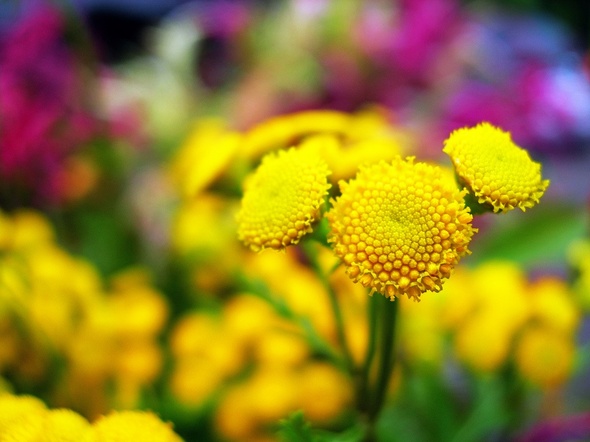Seasonal allergies getting worse? Here are 3 ways to reduce symptoms without medication

Photo courtesy of Flickr user docksidephoto
You can’t control pollinating trees and grass, ragweed and mold floating around in the outdoor air, but there are things you can do - without medication - to improve your body’s reaction to all of it, said James Baldwin, an associate professor of allergy immunology at the University of Michigan.
There are two general types of allergies, Baldwin said. Seasonal allergies are born from the trees, grasses, weeds, mold and other elements outside. Year-round allergies stem from dust mites, animal dander, mold inside and other indoor offenders.
“As I tell all my patients, allergies are like straws on a camel’s back. The camel can carry a little bit, but once you get too many, the whole system breaks down and you start having symptoms.”
If your allergy cup runneth over - a likely scenario, since we’re in the midst of ragweed season in southeast Michigan - here are a few things you can do for relief before turning to medication, according to Baldwin.
1. Keep dust mites at bay by focusing on the bedroom
Microscopic arachnids called dust mites love to live where humans lie - in the mattress, in the pillow, in the carpet and on the furniture. Dead human skin is a favorite meal, and many people are allergic to the creatures’ feces.
Baldwin recommends encasing the mattress and pillow in plastic to ward off the bugs, keeping the bedroom clean and free of clutter to reduce the mites’ presence. Washing sheets in hot water will also help, he said.
If you have seasonal allergies in addition to indoor allergies, reducing the presence of dust mites can go along way to ease suffering, Baldwin said.
“We spend about a third of our lives in our bedrooms,” Baldwin said. “It’s a huge allergen load. I have patients who are dust mite and ragweed allergic. They come in and say they’re miserable in the fall, and ignore the dust mite advice I give them. Would you sleep 365 days per year with your nose in a ragweed field?”
2. Avoidance
It may be impossible to totally avoid the allergens that ail you, but there are some things you can do to reduce the overall load, Baldwin said.
Keeping pets out of the bedroom, frequently dusting and vacuuming carpet or keeping humid or mold-prone areas dry and clean are avoidance strategies to consider.
3. Nasal irrigation
A good nasal rinse can wash allergens away and help to relieve a miserably clogged nose and nasal drip.
Different methods entail using a squirt bottle, which uses more pressure, or a pot, which uses less pressure. Squirting or pouring a salt-water solution into the nose and through the sinuses can provide relieve to nasal allergies. A really clogged nose might require more pressure to complete an irrigation, Baldwin said.
You can purchase these at drug stores or make your own system.
View a University of Michigan Health System video for more on the procedure below.
Baldwin said medication, and in the most extreme cases, allergy shots, can help to provide relief if the nothing else works.
What are you doing to improve allergy symptoms? Have any of these methods worked for you? Take our poll and/or leave a comment below.
Juliana Keeping covers general assignment and health and the environment for AnnArbor.com. Reach her at julianakeeping@annarbor.com or 734-623-2528. Follow Juliana Keeping on Twitter


Comments
1bit
Thu, Aug 18, 2011 : 9:32 p.m.
I'm curious as to why the focus was dustmites, when it is ragweed season. Anyway, some people are fond of eating honey from local sources as a method of immunotolerance to local antigens. I'm not sure if it works, but it is delicious nonetheless and a good reason to go out to the local farmer's market.
Technojunkie
Thu, Aug 18, 2011 : 1:05 p.m.
Most of your immune system is in your gut so healing a damaged gut will do wonders for reducing allergies. My seasonal allergies went away after healing mine. For most people a Paleolithic diet might be adequate. Grains have chemical defenses and can do serious damage. I needed much more than an improved diet, including allergy shots, but shots alone were inadequate. Probiotics, digestive enzymes and Butyrex from Jigsaw Health (they advertise on WAAM) were a huge help, the rare supplements that actually work. It took a while but now I can mow grass without even getting a runny nose. Until you're healed, Cromolyn Sodium nasal spray is great stuff. It used to be the prescription drug Nasalcrom. CVS carries it. It's a mast cell stabilizer, much safer than the newer and in my experience much less effective prescription steroid sprays. Remember, big pharma wants something new and different that they can patent to sell you. It doesn't have to be better. National Allergy Supply sells American made mattress covers for keeping out dust mites along with sinus irrigators, etc if you can't find what you need locally.